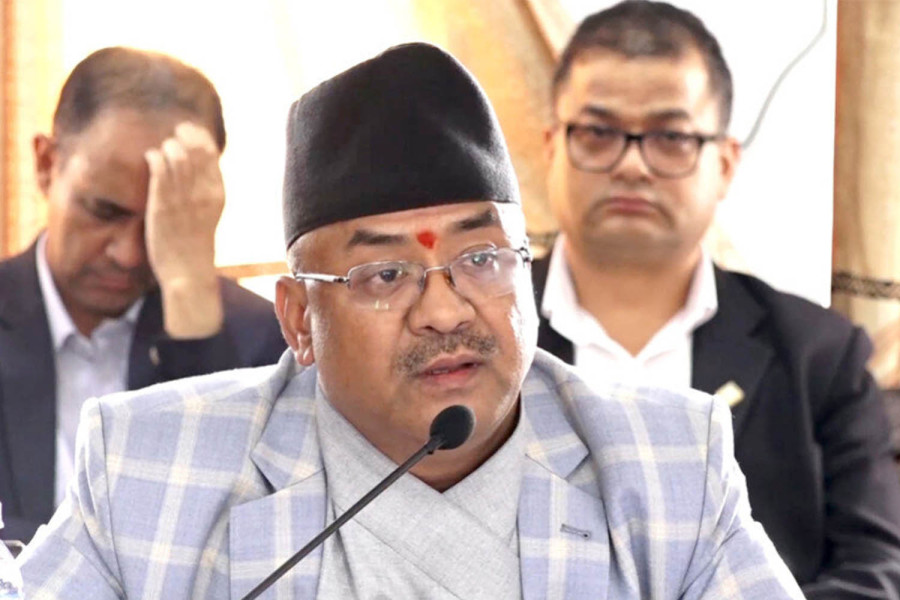Politics
Hearing panel rejects Pradhan’s nomination for election commissioner
Rejection follows allegations of past sexual abuse and Pradhan’s withdrawal of candidacy on Monday.
Binod Ghimire
The Parliamentary Hearing Committee on Monday rejected Krishna Man Pradhan’s nomination as an election commissioner hours after he decided to withdraw from the race.
A meeting of the committee unanimously reached the decision, saying Pradhan himself had recused himself from the hearing process. The committee, which has members from both chambers of the federal parliament, was supposed to decide on Monday whether to accept his recommendation. Its meeting originally scheduled for the morning was postponed until the evening as cross-party lawmakers sought time for internal discussions on the matter.
If the lawmakers’ claims are anything to go by, they were prepared to reject his nomination. Seeing his chances of getting the parliamentary committee’s approval evaporate, Pradhan wrote to the committee’s chairperson, informing that he wanted to withdraw his candidature.
“Although my recommendation for the position was based on merit, I have no enthusiasm for executing the duties in the proposed position amid the organised smear campaign against me. I, therefore, withdraw my name from consideration for the post,” Pradhan said in the letter submitted to the parliament secretariat.
Hours later, the House committee’s meeting rejected his nomination based on the same letter. “The committee has unanimously decided to reject Pradhan’s candidacy for election commissioner, as he is not willing to give continuity to his candidature,” said Pashupati Samsher Rana, the committee chairperson.
On June 16, the Constitutional Council headed by the immediate past prime minister, Pushpa Kamal Dahal, who also chairs the CPN (Maoist Centre) had unanimously nominated Pradhan for the position. Speaker Devraj Ghimire, National Assembly chair Narayan Dahal, Chief Justice Bishowambhar Prasad Shrestha, and Deputy Speaker Indira Rana approved the nomination without questions. Nepali Congress President Sher Bahadur Deuba, who was leader of the main opposition at the time, also gave his stamp of approval.
However, the decision landed in controversy after a woman came forward accusing Pradhan of sexually exploiting her for five years. She not only filed a complaint but also appeared before the House panel with ‘evidence’ to back her accusation.
The victim had presented the evidence of her complaints and court documents showing that the case was settled, along with an audio record demonstrating how she was exploited. Appearing before the committee, she claimed that Pradhan used his influence to prevent her from filing complaints with the police.
She claimed that Pradhan sexually exploited her in his office and other places continuously from 2018 until last year. The issue was settled in Kathmandu District Court after Pradhan paid over Rs10 million in cash. The victim has accused Pradhan of using his power to reach this settlement.
“I filed the complaint [with the committee] to stop such a morally corrupt person from taking a constitutional position. How can you approve his nomination?” she questioned the lawmakers on the committee.
On Wednesday, the panel, after a long hiatus, quizzed Pradhan seeking his clarification over the allegation.
During the hearing, cross-party lawmakers grilled Pradhan on how he would address the serious allegations of sexual violence and questioned his moral integrity. Most members of the 15-strong committee had asked him as to how he was eligible to hold the constitutional position given the grave allegations.
In defence, Pradhan said that the issue was settled in court, and both the sides—he and the woman—had agreed not to raise it further. He had claimed that he was unnecessarily being dragged into controversy.
There was widespread pressure on the parliamentary committee to reject his nomination. This is the second instance of a nominee for a constitutional position being rejected since the start of the parliamentary hearing process. In August 2018, the hearing committee rejected Deepak Raj Joshi's nomination as Chief Justice. However, the decision to reject Pradhan was taken only after he had withdrawn his candidacy.
A two-thirds majority of the 15-strong committee, which has lawmakers from both chambers of Parliament, can reject the nomination.
Experts on parliamentary affairs say over the years, the hearing panel has become a rubber stamp for top leadership. Yet it is a platform where complaints can be lodged, which helps create public debate. “The media and the civil society took up the issue based on complaints filed at the committee. I don’t believe these lawmakers would have dared to reject the nomination if there was no such pressure,” said Som Bahadur Thapa, a former secretary at the Parliament Secretariat.
Pradhan, who has been the executive director of the Nepal Law Society for over two decades, reportedly maintains a good rapport with political and judicial leaderships.




 22.6°C Kathmandu
22.6°C Kathmandu













